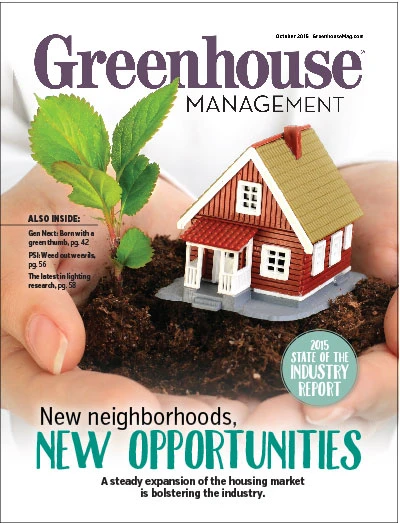 Born with a green thumb, Nick Baker was destined for horticulture, even if at first he didn’t know it.
Born with a green thumb, Nick Baker was destined for horticulture, even if at first he didn’t know it.
As a small child, he watched his family found Baker’s Acres, a garden center and greenhouse operation in Alexandria, Ohio. With a passive interest, he saw the company grow. He was always around growers and their plants, but never wanted to plant seeds of his own or thought of it as a potential career.
“I was never really interested in it,” he says. “It was just kind of there. There were just greenhouses in the backyard.”
So, Baker bolted and headed for the green hills of Athens, Ohio, where he enrolled at Ohio University. After a couple of years, he decided to transfer to upstate powerhouse, Ohio State University, in Columbus.
But eventually, the collegiate lifestyle lost its shine and Baker lost interest in his studies. He dropped out.
In 2007, he found a new direction.
“I went back to work for my parents [at Baker’s Acres],” he says. “Surprisingly, I was good at the work. So I stayed with it.”
Within a year, Baker was doing what he calls “serious growing.” Now, 35-year-old Baker is the company’s head grower, and has taken over the primary greenhouse duties, though his father still works in the greenhouse on a near-daily basis.
How things change
Now Baker’s days involve monitoring all of the greenhouse’s growing systems, delegating to the staff at Baker’s Acres, propagation and crop maintenance. There are other office-bound duties that he must also attend to. But, he says, he’d prefer to be working with the plants.
“I spend a lot of time in the office,” he says. “But I’m not great there. I’d rather be in the greenhouse, working with plants. So, I try to divide my day as best I can between the business side of the operation and the growing side.”
Baker’s typical day is not unlike that of other head growers. He arrives early, with his dogs. He walks his pets around the facility before heading into the greenhouse. Once inside, he inspects the plants and the growing systems. Then, depending on the time of year, he issues direction to the staff. In the winter, he and his wife will begin propagating and working on the next year’s crops.
“We water by hand in the greenhouse,” he says. “It’s a lot of watering.” He says the greenhouse waters by hand because that's what they “have available.”
Baker’s Acres grows almost 100 percent of its own crops, including the annuals, they offer. He says that the only crops they receive finished are tropicals, trees, shrubs and some perennials.
“Everything else we grow ourselves. In fact, we propagate ourselves too, including the succulents and begonias,” he says.
For Baker, there are a few special treats to grow. He likes annuals. He loves succulents. He even describes himself as a “big succulent nerd,” noting his large collection. In fact, the plants that he loves to grow are only united by one, simple characteristic — they’re exciting.
“I don’t really like boring plants. Cool leaves, cool foliage, cool blooms, that’s what I like,” he says. “Begonias, coleus — I enjoy working with those types of plants.”
This focus on exciting plants has helped Baker’s Acres develop a repertoire of rare and exotic varieties. Baker calls his retail operation a “boutique garden center.”
A vibrant future
Beneficial insects are another aspect of Baker’s job that he describes as “exciting.” Baker’s Acres has transitioned, completely, to the use of beneficials and biologicals. The company no longer uses any chemicals, he says.
The decision to make the jump was made in the summer of 2014. Baker and his team cleaned out the property and then let it “bake for a couple of months” before bringing back all of the stock plants. They introduced their beneficials at the same time.
“It’s been interesting seeing what happens in a greenhouse when you stop spraying and you just use beneficial insects,” he says. “You start getting things chewing holes in your plants that you wouldn’t normally see.”
He says that caterpillars, a pest that had never presented a significant problem for Baker’s Acres, are now hungrily munching through the company’s coleus. And caterpillars are just one of many new opponents. Baker says it has been “fun learning and seeing what happens next.”
“Before, we were trying to battle thrips, nonstop, with chemicals. But we could never really control them,” he says. “But with beneficials, thrips are one of the easiest to control. It’s pests like aphids that are suddenly a problem, suddenly harder to control.”
He says that the greenhouse, with all the buzzing beneficials flying around, is more vibrant and alive than ever.
Expand the customer base
Currently, Baker’s Acres sells to other independent garden centers.
“Mostly we sell them begonia liners or coleus planters, that sort of thing,” he says. They do some special orders, but the majority of its business comes from its retail presence.
However, being a boutique garden center and greenhouse operation isn’t the end of Baker’s Acres development, Baker says. He wants to start reaching new and varied customers. To do that, he’s experimenting with new growing techniques (like solely using beneficial insects for pest management) and streamlining other production methods, trying to become more efficient. Partly, Baker wants to keep up with rapidly changing practices, but he also wants to find out what appeals to younger crowds. His hope is to expand the reach of the gardening industry and make it more appealing to everyone.
“I’d like to try and get into grocery stores. I feel like millennials like to shop at Whole Foods and other stores like that,” he says. “They’ll walk in, see a cool succulent and want to buy it. That can be a gateway to other gardening.”
He also wants to produce foolproof plants, plants that are almost impossible to fail with. “Our goal is to streamline our plants. We want them all to be really great for the customer,” he says.

Explore the October 2015 Issue
Check out more from this issue and find your next story to read.
Latest from Greenhouse Management
- Flexible fungicides
- Super Charged Moon Juice from Moon Valley Nurseries now available nationally
- 2025 Proven Winners Horticulture Scholarship applications now open
- How to improve inventory and shipping management in the greenhouse
- Leading Women of Horticulture: Anna Ball, Ball Hort, and Terri McEnaney, Bailey Nurseries
- GM CEA HERB Part 2: A guide to increasing the sowing density of culinary herbs
- GM CEA HERB Part 1: Best practices for producing culinary herbs in controlled environments
- USDA fires experts on invasive pests, including Asian citrus psyllid, chilli thrips







